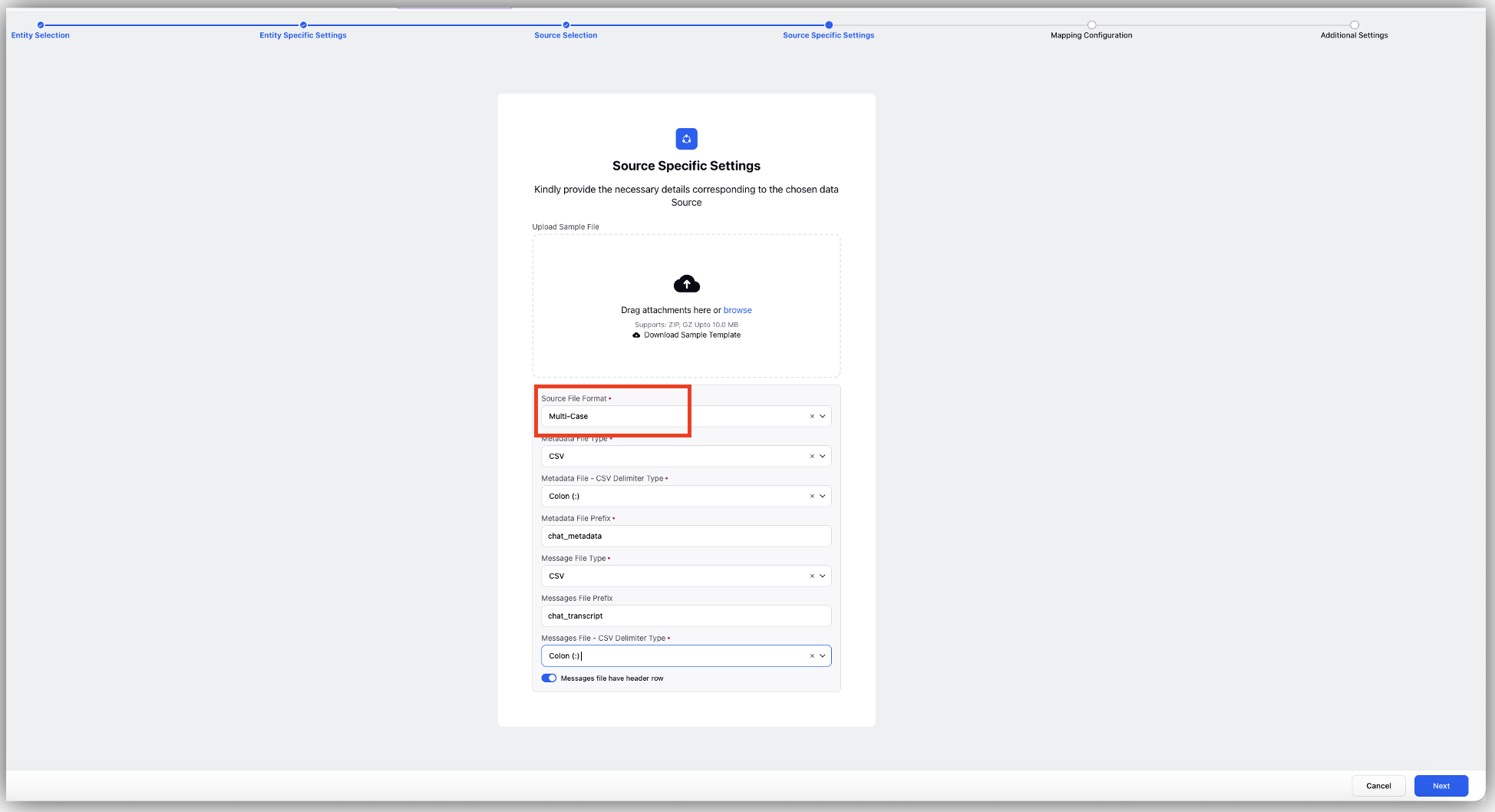A Multi-Case file format is defined for Live Chat cases in addition to a Single-Case format. In a Multi-Case file format, a single zip file contains a metadata file and a message file that corresponds to multiple cases. Here in the metadata file, there are more than one conversation id and multiple rows, where each conversation id refers to one Case. Using this conversation id, you can map the message with the case.
Guidelines for Multi Case File Format
This section provides a walkthrough on how a Multi Case File can be formatted, what are it's components, and the various mandatory fields, like conversation id, that separates one unique case from another.
Here are guidelines for a Multi-Case File format for successful import of multiple live chat cases.
| |
| Ensure a single, consistent directory is present where Sprinklr configuration searches for files. Ensure a one-to-one mapping between a specific importer configuration and a directory. No two importer configurations can point to the same directory.
|
File Extension and Content | |
| Maintain a consistent prefix for zip files. The configuration searches for zip files with a consistent prefix, for example, Partner_Call_1.zip, and Partner_Call_2.zip. Like the zip file, include a prefix for the metadata file inside the zip/tar file.  Note: Inside zip/tar, if Sprinklr does not find any metadata or message file with expected extensions then that zip/tar file gets ignored. Note: Inside zip/tar, if Sprinklr does not find any metadata or message file with expected extensions then that zip/tar file gets ignored.
|
| |
| Metadata file contains all case level details: Conversation_Id: Every conversation must contain a unique conversation ID for system identification. Using this conversation Id you can identify which message belongs to which case. Multiple rows contain multiple Conversation IDs where each Conversation ID refers to one case. (Mandatory Field) Case Start_Time: Refers to the time when the Case started. If the timestamp of messages is not present in the metadata, the current time of upload is considered in the case creation time. Customer_Id: Identifies the customer in a Live Chat case.  Note: The system does not currently support the import of customer profiles. If the customer ID is present, a new profile is created; otherwise, the case is associated with a backend-created profile consistent across partners. Note: The system does not currently support the import of customer profiles. If the customer ID is present, a new profile is created; otherwise, the case is associated with a backend-created profile consistent across partners.
Custom fields: The user can map custom field from the source system to Sprinklr custom fields.

|
| Message level file contains message level details. Message_Timestamp: Exact time when a message occurs. If this timestamp is not present, the system determines the message insertion time as the time at which this was sent (not recommended) Message_Text: Exact content of the message. (Mandatory) Author_Id: Refers to the unique Id of the end-user who initiated the chat present in the Message file. It specifies if the message is sent by the agent or the customer. (Non Mandatory)  Note: If the customer ID in the metadata file matches the author ID in the message file, the system determines it as a customer message; otherwise, an agent (or bot) message. Note: If the customer ID in the metadata file matches the author ID in the message file, the system determines it as a customer message; otherwise, an agent (or bot) message.
Object_Id: Each message has a unique object ID.(Not Mandatory)

|
| On an average, SFTP integration takes 1 second to upload a live chat case containing around 100 messages (both brand and customer). |
Multi Case Format in Source Specific Settings Screen
In Source Specific Settings screen, you can select Multi Case format from the Source File Format dropdown. Using this field you can specify whether the zip file pertains to one case or multiple cases.

For information on various parameters and their description for Live Chat in Source Specific Settings screen, refer Source Specific Settings for Live Chat.
Note: For information on Single-Case format for Live Chat cases, refer Ingestion of Live Chat Cases.


